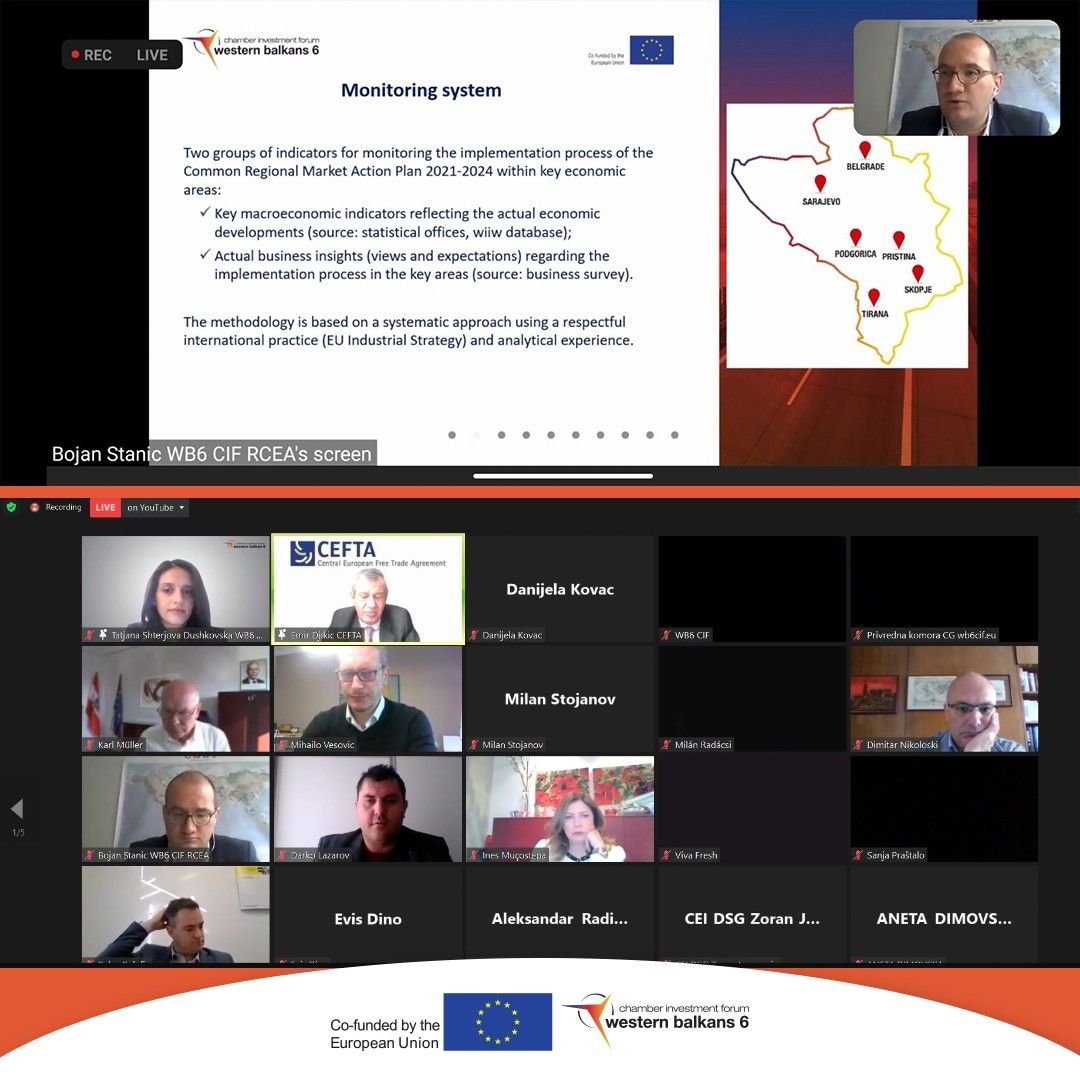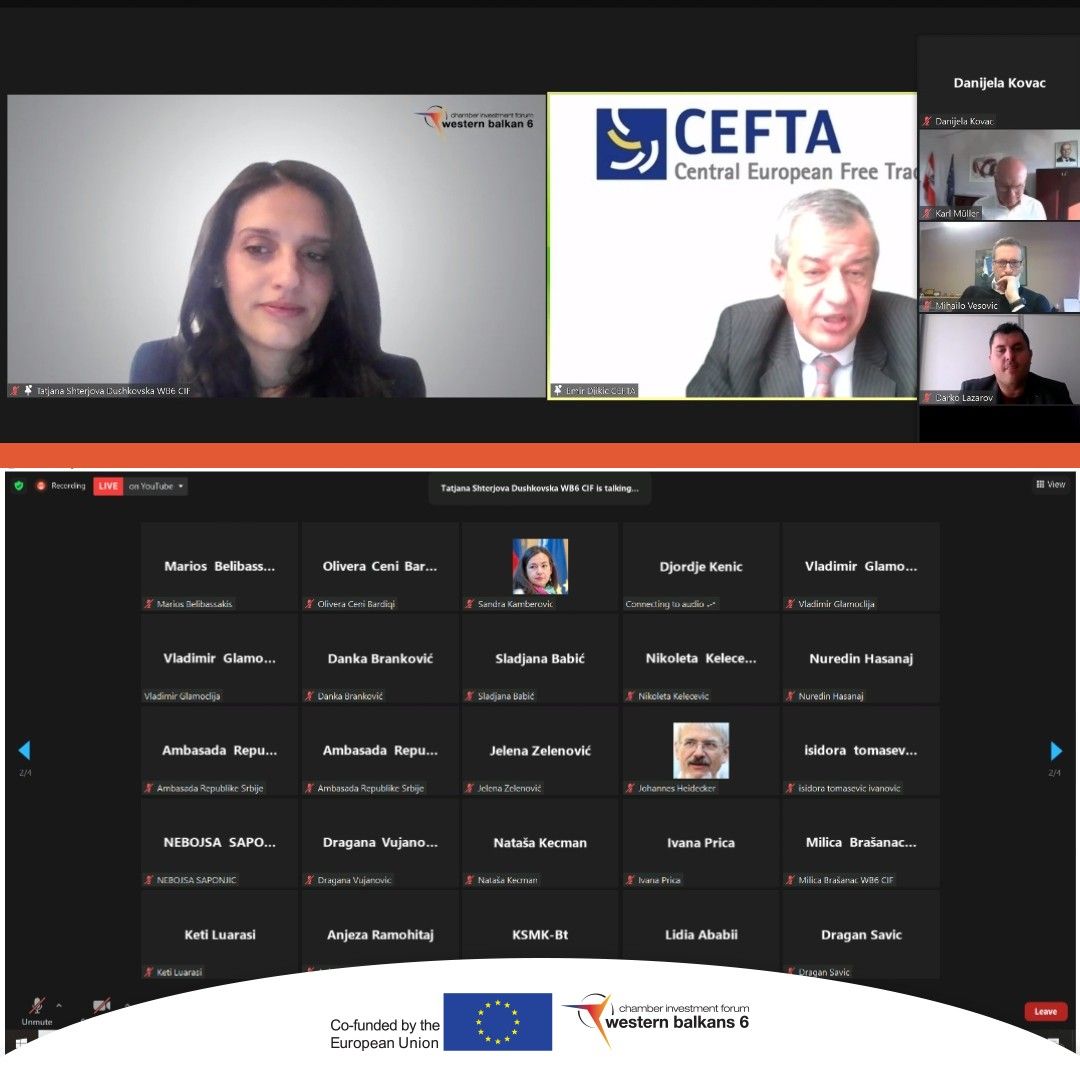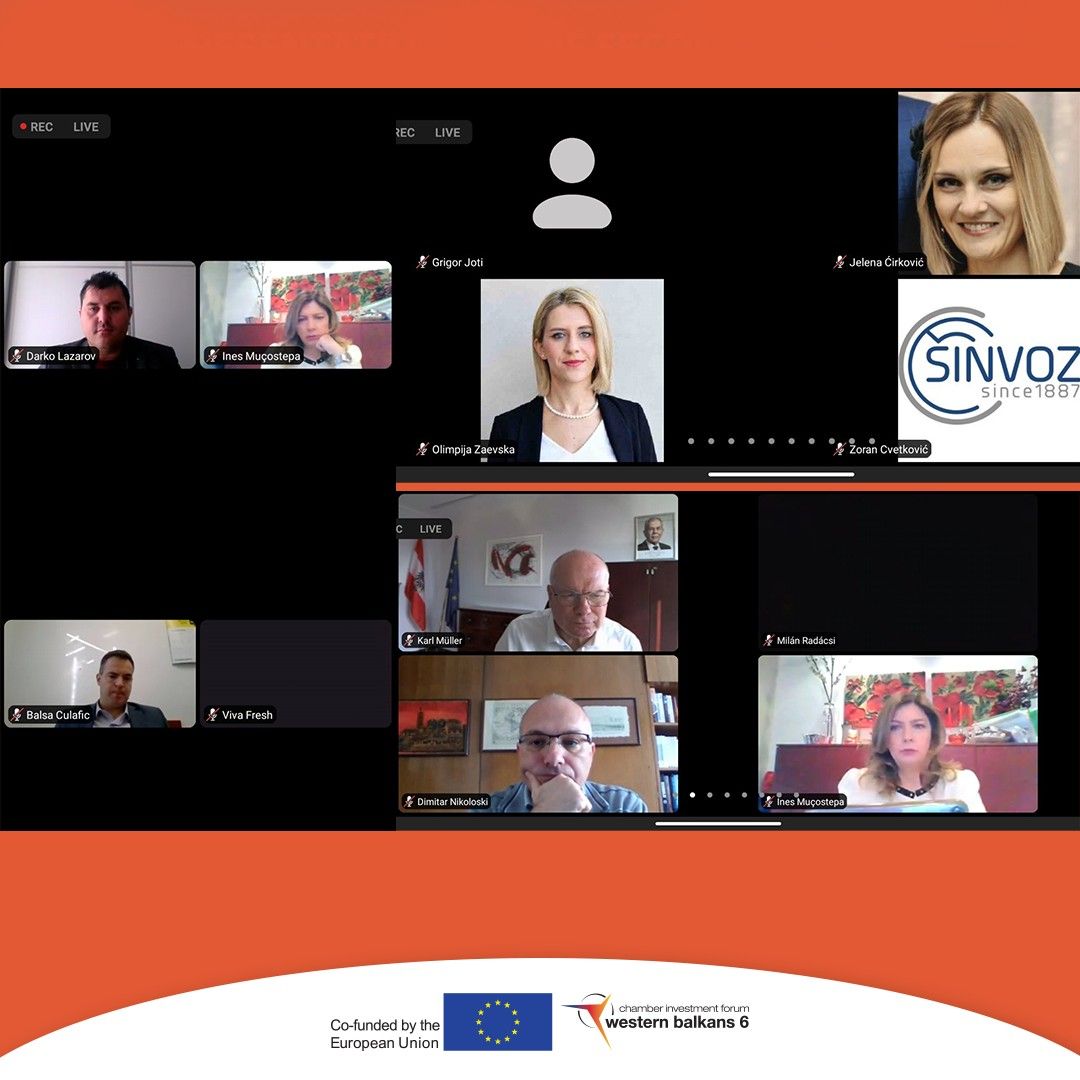
SUCCESSFUL PRESENTATION OF THE SECOND REPORT – “Monitoring the Implementation of the Common Regional Market Action Plan (2021-2024) – Key Business Insights on Priority Action Points”
With the presence of more than 120 participants, in the organization of the Western Balkans Six Chamber Investment Forum (WB6 CIF) the Second Report “Monitoring the Implementation of the Common Regional Market Action Plan – Key Business Insights on Priority Action Points” was successfully presented. The event was moderated by the WB6 CIF Secretary General Tatjana Shterjova Dushkovska who pointed out that Western Balkans Six Chamber Investment Forum (WB6 CIF) and its Business Council committed to monitor the implementation of the Common Regional Market Action Plan (CRM AP), with the intention to provide continuous feedback to the policy makers, national authorities and all interested stakeholders on the reflections of the business community.
At the very beginning participants were welcomed on behalf of the WB6 CIF by Mr. Mihajlo Vesović, director of the Chamber of Commerce and Industry of Serbia who said that the primary task of WB6 CIF was to ensure free movement of goods, services, people and capital throughout the region; to cut costs and make goods and services more competitive on the global market, also promoting the Western Balkans as a single investment destination within this process. WB6 CIF intention was to present key business insights on priority action points and the implementation of the CRM. Mr Vesović expressed sincere hope that next report will have decisions and at least a few multilateral agreements whose implementation will be able to measure and quantify, as it is intended and planned to do.
As Director Vesović pointed out, the WB6 CIF Survey that was behind the report was conducted on a sample of 500 companies. The findings are presented through the frequency of answers, i.e. medium values. The survey focused on two main areas: Part A including key economic activities for Western Balkans and Part B, Implementation of the measures and activities stipulated in the Common Regional Market Action plan. Part A consists of topics regarding economic activity, foreign trade activities and business activities (capacity utilization, turnover, labour and important topics for business regarding to finance and payment, administration, demand and resources), while Part B consists of topics regarding trade, investments, labour force, digital and industrial and innovation fields.
Having in mind that the event was held within the CEFTA WEEK framework, Mr. Emir Đikić, Director of CEFTA Secretariat expressed his gratitude to WB6 CIF as the organizer and the representative of the business community which is extremely important for the implementation of the Common Regional Market Action Compared to the implementation of MAP REA, AP CRM achieved certain results and positive insights including visible effects. That is because of the private sector, which was through WB6 CIF being involved not only in the implementation of the CRM AP but also in its preparation. Directions and recommendations, likewise a pressure from the business community is, perhaps, the key factors that will certainly contribute to the realization of the set goal, which is the creation of Common Regional Market and ultimately EU integration of the Region. According to Mr. Đikic, reporting on indicators is an important tool for monitoring the implementation of CRM, and monitoring by the business community puts pressure on decision makers to be more efficient and effective. Moreover, synergies between official data and business community perception data should be used as an indicator of the need to improve communication with the economy. Mr. Đikic used the opportunity and invited participants to the conference that will be held on December 16th, where the heart of the discussion will be the recognition of agreements, which are a large part of the recommendations.
After the introductory remarks followed presentation of the Report held by Mr. Bojan Stanic from the WB6 CIF Regional Centre for Economic Analysis.
Mr Stanić explained that there were two groups of indicators used for monitoring the implementation process of the Common Regional Market Action Plan 2021-2024 within key economic areas:
– Key macroeconomic indicators reflecting the actual economic developments (source: statistical offices, wiiw database);
– Actual business insights (views and expectations) regarding the implementation process in the key areas (source: business survey).
Almost a year after the implementation of the Common Regional Market Action Plan has started, many uncertainties still remain – the pace of the implementation of the action points set in the document was not at the desired level. However, this report confirms that the full implementation of the Common Regional Market remains an issue of utmost priority for the region’s business community, and despite the laggings in its implementation in the first year, the issues stated as action points in this document still remain valid requests of the regional business community and businesses across the region expect to see visible shifts in relation to the issues selected as Key Priority Areas.
The waiting time at the border crossing points needs to be minimized and predictable. The activities within the bilateral agreements have to be clearly coordinated between all parties in a uniform way. Infrastructure and staff, along with the border procedures, remains the key obstacle in providing smooth movement of goods within the Western Balkans. However, the waiting time between the region and the EU poses a more significant problem to the business community. Main challenges are the lack of harmonization of working hours between the border agencies, the lack of coordination among the different agencies involved in physical inspection. There is a need to overcome gaps in regional cooperation.
The non-tariff barriers present one of the largest obstacles to doing business in the Western Balkans, there is strong urgency concerning the need to aimed to streamline and harmonize NTB across the region in the forthcoming regulatory reforms.
Regarding the harmonization of rules, the main problems are related to the importation, exportation and transit procedures, including the clearance of goods, as well as the lack of border agencies cooperation.
Rules and procedures across the region are not clear enough and it takes time to foreign trade companies to collect all information from different sources. Those problems stress the importance of up to date all online official sources and prepare clear guides.
Enabling companies to provide services across the region on equal term through the AP6 implementation in order to liberalize trade in services should also be one of the priorities. The main barriers for providing services across are licenses, different technical standards, non-transparent rules and procedures.
Mutual recognition of professional qualifications should be agreed, starting with a framework arrangement covering select pilot qualifications. It is equally important to remove obstacles to the mobility of students, researchers and academics. The biggest problems in the context of employment are the long procedures for obtaining work permits. In the short-term procedure for recognition of qualifications within the region could be simplify by draft an agreement. In the medium term, it is necessary to develop a methodology for the development of regionally recognizable standards of occupations, which are the basis for the standard of qualifications in most countries.
Activities for abolishing the key restrictions impeding the movement of capital across the region (to cross-border capital transfers, cross-border investments and loans) directly affect the rate of intraregional investments, and activities in this area should gain priority even prior than 2024.
Companies lack detailed information on all issues related to the Green Agenda for the WB, and are in need of capacity building in these areas, and activities in this regard directed towards the business community from the Western Balkans should be given additional support in the forthcoming period.
Regarding the digital readiness, the survey shows that companies reported need for acceleration of digitalization process in foreign trade business (customs, border crossings, economy). Main business comments stresses need for digitization of administrative procedures, especially in areas where paperwork is required. Further support for business in the WB6 region should include digital transformation and encouraging e-commerce to facilitate entry into other markets.
The results from the conducted survey indicate that companies are mostly oriented towards business conditions in the domestic market, and potentials of interregional cooperation have not been used to the full capacity. Data confirms that the issue of securing access to finance still remains the first key concern for the region’s businesses, whilst the issues of availability and costs of the resources are still ranked high on the list, with striking 2/3 of the surveyed importing companies state finding no domestic production as a reason for import, confirming that in the following time-frame the activities for implementation of the Regional Supplier Development Program lead by the WB6 CIF, aimed at better linking regional businesses in supply chains, with potential focus on developing joint regional final products, should be further supported.
After the presentation, Mr. Tatjana Dushkovska invited participants to an open discussion as an opportunity to ask questions and also to give some comments on the Report. She has also thanked to all the acters engaged in the realization and preparation of such and valuable Report as this one is.
Mrs. Olga van Zijverden used the opportunity and refer to the recently published Nearshoring Study which main take-aways would be that the Western Balkan economies can indeed benefit from near-shoring trends in the post-pandemic world, but their governments will have to take a very active role and use available policy levers in a sensible way to achieve that. Near-shoring to countries and regions closer to Western Europe is likely to emerge after the pandemic. Even if it turns out to be on a smaller scale, it can still have a major impact on the Western Balkan economies due to their small sizes. And the surveys undertaken as part of this study show that th. Western Balkan economies appeal to Western European companies, not just because of their good geographical locations and competitive wage levels, but also because of ‘soft’ factors such as cultural proximity and the reputation of their workers as skilled and hard-working. But in order to enhance their potential in the post-pandemic world, the analysis shows that Western Balkan economies could benefit from maximizing their strong sides, and minimizing their weaknesses.
Mr. Darko Lazarov, Professor at the Faculty of Economics in Stip, also took part in the discussion and said that the document reflects the state of the economic, especially business environment at the regional level. Conclusions and recommendations based on the analysis are a useful guide for decision makers to improve the business environment in the region, as well as to work on policies that will accelerate the process of integration of countries in the region, but also the process of integration into the global supply chain. According to Mr. Lazarov, these problems are very important for decision makers, especially the fact of lack of production capacity and poor competitiveness. Limited production capacity is a major problem. In this context, one of the suggestions is to conduct research on sectors whose products are poorly or not represented in domestic production, to make a list of products that domestic producers could produce. Governments in the region should be more involved in the research process, to support companies in expanding production capacity and improving production. The future influence of the FDA should be channelled for the purpose of domestic production, in order to replace imports with domestic production. He also stressed the importance of the supply chain and the benefits it brings.
On behalf of DG NEAR, Mrs. Alessandra Viezzer said that today’s presentation was an interesting event and a great opportunity for the process of promoting integration while statistically, it was very impressive. The Report gives a sense of what can be accomplished. As Mrs. Viezzer has said, the business community was heard clearly, it has been heard what will be done, but everything that needs to be done is in the shadow of political conflicts. What the business sector can do more to make politicians aware that there is much to do on further integration. Her message to the participants was to push the barrier.





